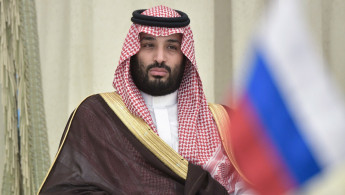Follow us on Facebook, Twitter and Instagram to stay connected
US eyes Saudi Arabia to normalise Israel relations next
Following the UAE's decision to normalise relations with Israel, all eyes are now on Saudi Arabia.
2 min read
Saudi Arabia proves hard game [Getty]
As the United Arab Emirates (UAE) normalises relations with Israel, experts argue the United States, who brokered the original deal, is turning its sights on Saudi Arabia, though the Kingdom could be a challenge.
“I’ve had many discussions now with MbS about…[the possible normalisation of relations], and also with King Salman,” Jared Kushner, White House Senior Adviser and President Donald Trump’s son-in-law told reporters.
He added that normalising relations with Israel would be “very good” for Saudi business and defence, as well as for the Palestinian people.
“King Salman has a very strong place in his heart for the Palestinian people and for the cause, and MBS does as well,” Mr Kushner told reporters on Monday. “They do want to see the Palestinian people have a state.”
However, Prince Mohammed bin Salman, who appears to have been happy to push Palestinians to accept the US Middle East peace plan, was halted by his father the king.
King Salman told Palestinian leader Mahmoud Abbas in a phone call earlier this year that the kingdom will continue to support Palestinians and their rights, according to the state news agency.
Saudi Arabia has yet to publicly comment on the UAE/Israel deal, but a source told the Financial Times Saudi was “very different” to the UAE.
“It’s smaller and doesn’t have that religious element. What the UAE has to lose is much less than us, and what they have to offer Israel is much less," the person said.
“If you ask a 30-year-old Saudi, they may say ‘Why not have relations with Israel? They have great technology and academia.’ But they would care if we actually did because the whole Muslim world would lambast us.”
Indeed the US may face a tough uphill battle with Saudi Arabia.
The Kingdom on Wednesday said it would not follow the United Arab Emirates and establish diplomatic ties with Israel until the Jewish state had sealed a peace accord with the Palestinians.
Saudi Foreign Minister Prince Faisal bin Farhan told reporters on a visit to Berlin that "peace must be achieved with the Palestinians" on the basis of international agreements as a condition for any normalisation of relations with Israel.
Riedel agrees with this sentiment.
“There is no incentive to do it with annexation [of occupied territories] already off the table [as part of the UAE/Israel deal],” said Riedel.
"Once that is achieved all things are possible," Farhan said.
At a news conference with his German counterpart Heiko Maas, Prince Faisal reiterated criticism of Israel's "unilateral policies" of annexation and building settlements in the West Bank as "illegitimate" and "detrimental" to a two-state solution.
“I’ve had many discussions now with MbS about…[the possible normalisation of relations], and also with King Salman,” Jared Kushner, White House Senior Adviser and President Donald Trump’s son-in-law told reporters.
He added that normalising relations with Israel would be “very good” for Saudi business and defence, as well as for the Palestinian people.
“King Salman has a very strong place in his heart for the Palestinian people and for the cause, and MBS does as well,” Mr Kushner told reporters on Monday. “They do want to see the Palestinian people have a state.”
However, Prince Mohammed bin Salman, who appears to have been happy to push Palestinians to accept the US Middle East peace plan, was halted by his father the king.
King Salman told Palestinian leader Mahmoud Abbas in a phone call earlier this year that the kingdom will continue to support Palestinians and their rights, according to the state news agency.
|
Saudi Arabia has yet to publicly comment on the UAE/Israel deal, but a source told the Financial Times Saudi was “very different” to the UAE.
“It’s smaller and doesn’t have that religious element. What the UAE has to lose is much less than us, and what they have to offer Israel is much less," the person said.
“If you ask a 30-year-old Saudi, they may say ‘Why not have relations with Israel? They have great technology and academia.’ But they would care if we actually did because the whole Muslim world would lambast us.”
Indeed the US may face a tough uphill battle with Saudi Arabia.
The Kingdom on Wednesday said it would not follow the United Arab Emirates and establish diplomatic ties with Israel until the Jewish state had sealed a peace accord with the Palestinians.
Saudi Foreign Minister Prince Faisal bin Farhan told reporters on a visit to Berlin that "peace must be achieved with the Palestinians" on the basis of international agreements as a condition for any normalisation of relations with Israel.
Riedel agrees with this sentiment.
“There is no incentive to do it with annexation [of occupied territories] already off the table [as part of the UAE/Israel deal],” said Riedel.
"Once that is achieved all things are possible," Farhan said.
At a news conference with his German counterpart Heiko Maas, Prince Faisal reiterated criticism of Israel's "unilateral policies" of annexation and building settlements in the West Bank as "illegitimate" and "detrimental" to a two-state solution.





 Follow the Middle East's top stories in English at The New Arab on Google News
Follow the Middle East's top stories in English at The New Arab on Google News

![Israeli forces ordered bombed Gaza's Jabalia, ordering residents to leave [Getty]](/sites/default/files/styles/image_330x185/public/2176418030.jpeg?h=a5f2f23a&itok=_YGZaP1z)
